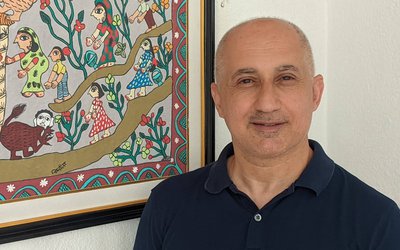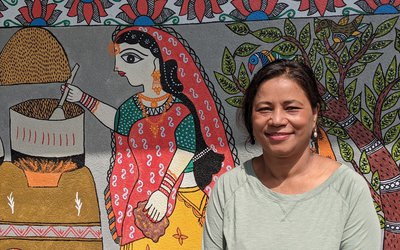
As Nepal has been celebrating the International Women's Day, how do you assess its significance in our context?
Unless women are respected, the overall development of the country is impossible. In our religious tradition also, women are given a high regard and respect. In the context of Nepal, the International Women's Day is significant as it reminds all of us to respect and empower women and provide them equal opportunity as men. Women need respect not only on this day but on every day. An overwhelming number of women in Nepal are dying due to simple complications in conception and delivery of children. I have spent my entire life for the Right to Reproductive Health of women through Marie Stopes Programs. Through the programs and various Projects under Marie Stopes International and Sunaulo Parivar Nepal (MSI and SPN), we have been able to save the lives of a large number of women in Nepal. International Women's Day inspires us to continue such campaigns to save women’s lives.
What gets you involved in this work?
My main objective is to improve the health status of women and provide necessary assistance to the needy, including the women of the remote areas. I have gone into this field with the national interest in mind and I am dedicated to serve my country. When I met a number of young women who were dying due to complicated and unwanted pregnancy, I decided to lead a campaign for safe abortion. I led Marie Stopes International Nepal for twenty years, taking it to a significant height. I am proud that the organization is still serving the country focusing on national needs. Marie Stopes International and Sunaulo Parivar have made a major contribution in reducing Maternal Mortality Rate and helped Nepal achieve the set target of Millennium Development Goals. This in itself is a matter of pride for Nepal.
When did the organization start?
The organization started its operations along with Marie Stopes International. My initiative in 1994 resulted in the first clinic in Biratnagar. My experience has shown that everything can be possible if an individual has the dedication and devotion towards work.
Don’t you think your work deserves recognition?
It is not important whether the government has recognized my work, however, finally, as the Chairperson of Sunaulo Parivar Nepal, I was honored by the Ministry of Health for the outstanding service provided by the organization. I am satisfied with what I have done in my life for the nation. During my 18 years as the country director of Marie Stopes International Nepal, I was able to open 61 Marie Stopes Clinics in various districts, including far and remote areas like Doti, Dadeldhura, Jumla and Taplejung. We were also able to provide job opportunities to 700 employees. We established clinics where the government did not have such facilities. I believe that the results speak volumes.
What is Sunaulo Parivar Nepal?
Sunaulo Parivar Nepal is a local implementing NGO of Marie Stopes International London. It is implementing all the programs on Family Planning and Reproductive Health with close coordination and collaboration with Ministry of Health and Social Welfare Council. MSI provides necessary financial and managerial support to implement safe motherhood, family planning and safe abortion programs. I am proud to be a part of the program which is making noteworthy contributions in improving the lives of women in Nepal. At a time when Nepal had a very high maternal mortality rate and lacked services to prevent unwanted pregnancies, and when there was no technical knowhow in safe abortion, Marie Stopes International showed interest to support Nepal. Then, a group of likeminded people, including myself, decided to register Sunaulo Parivar Nepal to work in close partnership with Marie Stops International. I feel proud to be the founder member of Sunaulo Parivar Nepal.
What is the state of Sunaulo Parivar now?
We have been implementing various programs throughout the country. Sunaulo Parivar has been working in family planning and safe abortion programs with impact on health, demography and economy. Between 2001 to 2014, SPN, with support from MSI, averted unintended pregnancies of 1,210,552with live births averted of 490,843 and 569,959 abortion averted. In health impacts, our programs averted 1983 maternal deaths and 7044 child deaths. Along with these, our program averted 368,057 unsafe abortions. Our programs also have impacts on Disability Adjusted Life Year (DALY). In the area of Maternal DALYs (Mortality and morbidity), our program averted 122,685, Child DALYs mortality of 595570. Our program has provided services to 33,638,085. In family planning, our program provides protection for 6434,353 populations. For a small country like Nepal, it is a great achievement.
How do the Sunaulo Parivar services avert the unintended pregnancy?
We started our program providing services to 20,000 in 2001. In 2014, our organization provided help to avert unintended pregnancy of over 120,000 young women. 2012 was the peak year with over 130,000 women being helped.
Our NGO has proved that it is in one of the highest levels where NGO are working in rural and interior parts of Nepal providing family planning services and saving women’s life by preventing and averting unintended pregnancies. Our NGO is now a pioneer and successful organization in family planning and reproductive health. It is a major contributor of health services to the nation. We have highly trained and motivated staff for counseling and carrying out family planning services.
As Nepal has already achieved MMR targets as proposed by MDGs, what does it need to do sustain the success in the context of SDGs?
With time, we have to change the pace and focus. Sunaulo Parivar Nepal will move ahead as per the government's policies and needs of this sector. We are working in close partnership with the government and we are always ready to move ahead as per national goal of action in this field.
Along with running clinics, we are also helping government in providing necessary training to the medical staff and other medical personnel as per request in order to improve quality of care in the country. Foremost need for Nepal is to maintain and preserve quality of care. Dedication to serve with new initiatives to expand services while maintaining quality will be essential to sustain success in the context of SDGs.
After retirement, how much time do you devote to the work?
I manage the time as demanded by the organization. After leaving the active role of Country Director of MSI/Nepal, presently as the chairperson of Sunaulo Parivar Nepal, I am totally dedicated to work with MSI Nepal for the success of the Programme .
Since you are the wife of an army chief, how have you contributed to Nepal Army’s families?
I worked as the Country Director of Marie Stopes International when my husband was COAS. As a head of Nepal Army Shrimati Sangh (Wives Association), I introduced a number of programs to uplift the livelihood of wives of Nepal Army’s lower ranks. As the insurgency was picking up and a number of army personnel died, I was moved by the plight of young widows. I formulated special programs to support them in their livelihood. I also stressed the need of family planning and reproductive agenda in Nepal Army. I also conducted several classes for wives of Nepal Army in maternal health related issues including child bearing, preventing unintended pregnancies so that everyone could benefit from it. Many army personnel lost their lives to protect the country and people. I launched vocational training to motivate and help the wives of over 1000 personnel, who sacrificed their lives in the war, so that they could stand on their own feet. Now I can see them raising their children in a self-reliant manner.
How can FP help poverty alleviation?
I am very much concerned about the rise of poverty in the country. The right family size through family planning can help families to sustain with the limited resources. Prevention of unwanted birth can help families to better raise and educate their children who can ultimately earn more for themselves and the family. With our motto “Children by Choice not Chance” MSI/SPN has made differences not only in reducing maternal mortality rate but also in reducing population growth. Together with our educational programme I can safely argue our family planning programme has contributed towards poverty alleviation in Nepal. I still believe that a lot can be done in this field. It is commitment and dedication with national interest which can guide us to meet the challenges.
As Nepal’s population is overwhelmingly dominated by the youth, how can your program align the focus?
We are now focusing on the young population. We are providing family planning related programs, including educating them on Family Planning, reproductive health and unintended pregnancies, through various types of projects for them. Sunaulo Parivar is introducing various programs directed at the youth. The program Meri Sathi is very popular among the youths.
How do you see the state of MSI?
When I started the office in Nepal in 1994 we had set the targets to be achieved as per the need of the country. When I was called for an interview in London, I expressed my target to expand the services in all 75 districts of Nepal. Along with my team members and with the help of MSI London, we had been able to open 61 clinics in most of the districts. Out of the 47 countries MSI is operating in, Nepal is considered to be a major success. MSI/SPN brand has already been established as a high quality and affordable service provider in the country. I believe that SPN, MSI Partnership will continue to be popular as leader in this field. As I have a great interest in serving the people and country, I feel proud that the programme could make a major impact in the country while also providing job opportunities to 700 staff despite various challenges. I am proud that the institution is still working in the area with focus on family planning and reproductive health targeting the youth population and women of Nepal. Overall it will have good impacts on the development of the country. I am confident MSI/SPN can play a vital role in the overall development of the country by supporting the government in meeting specific goals.
- TANAHU HYDROPOWER PROEJCT: A Significant Achievement
- Apr 15, 2024
- AMBASSADOR HANAN GODAR: Sharing Pain With A Nepali Family
- Mar 30, 2024
- VISIT OF KfW AND EIB TO NEPAL : Mission Matters
- Mar 25, 2024
- NEPAL BRITAIN SOCIETY: Pratima Pande's Leadership
- Mar 24, 2024
- NEPAL ARMY DAY: Time To Recall Glory
- Mar 15, 2024
















